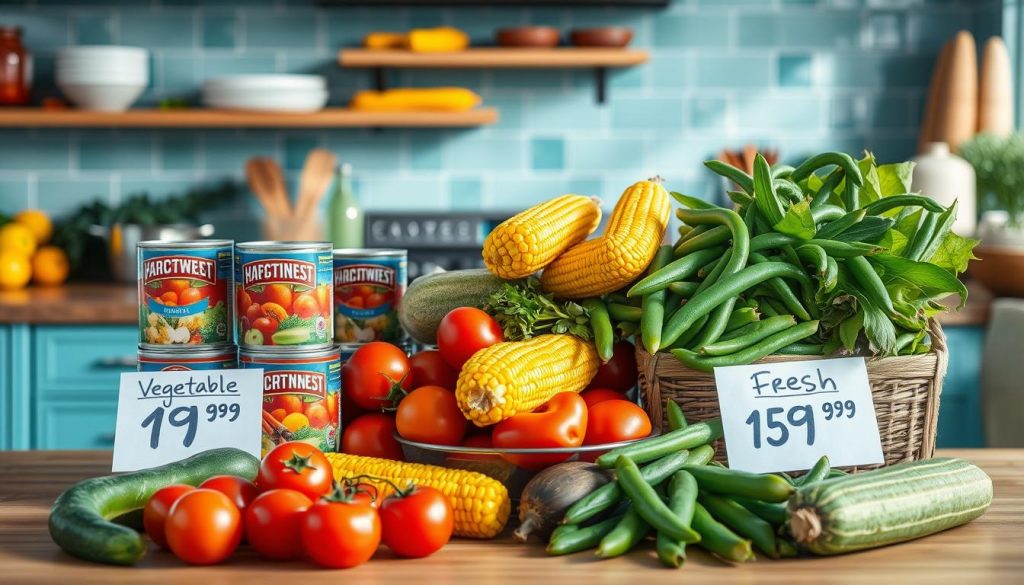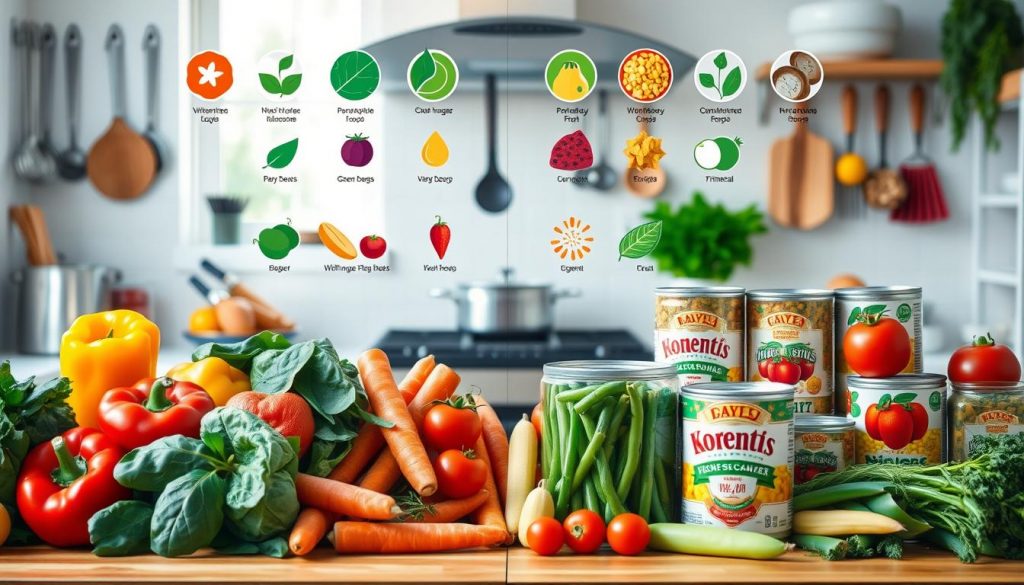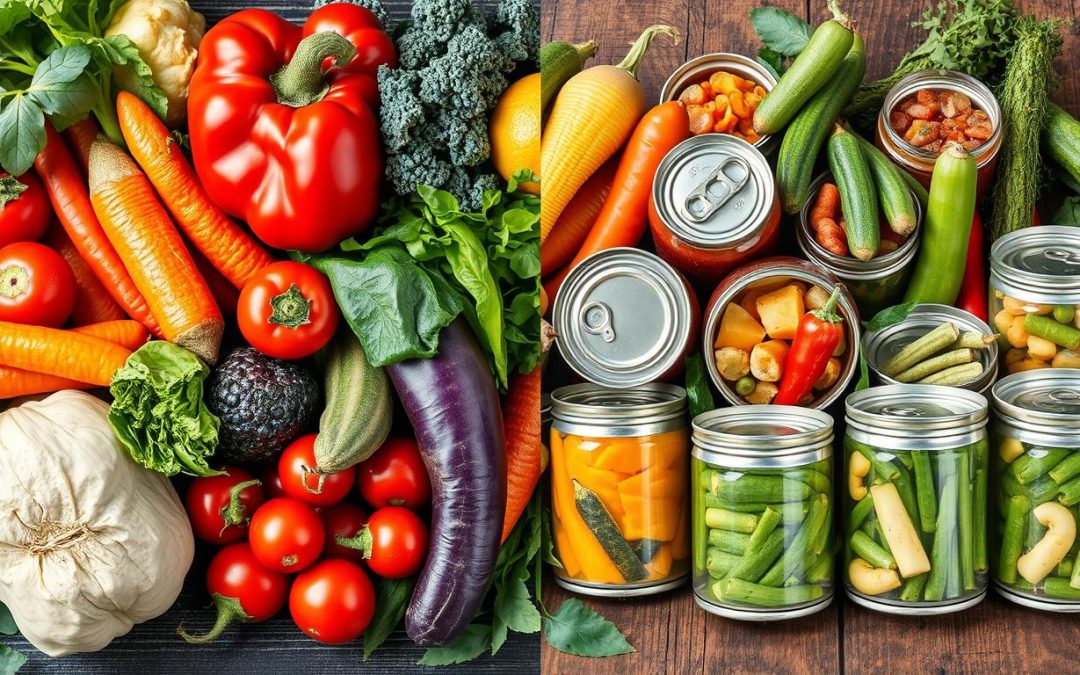When we compare canned and fresh vegetables, a big question pops up. Can canned veggies really offer the same health benefits as fresh ones? Or are they a less healthy choice? We’ll dive into the health perks of fresh veggies and the downsides of canned ones. This will help us understand their nutritional worth.
Did you know 88 percent of Americans think eating fruits and veggies is key to a healthy diet1? The nutritional gap between canned and fresh veggies is a big deal. It affects how healthy each option is.
We want to give you a clear picture of what canned and fresh veggies offer. This way, you can make smart choices about what you eat. Remember, 35 percent of people think canned veggies are less healthy than fresh ones1. By looking at the nutritional differences, we can see how canned veggies fit into a healthy diet.
Table of Contents
Key Takeaways
- Canned vegetables can be a nutritious alternative to fresh vegetables, with similar nutritional content.
- The benefits of fresh vegetables include higher nutrient retention and lower sodium content.
- Canned vegetables can be associated with a higher-quality diet, lower body weight, and lower blood pressure1.
- Fresh vegetables have a shorter shelf life, resulting in a quicker consumption cycle.
- Canned vegetables like tomatoes offer long shelf lives, making them economical and sustainable options2.
- Rinsing and draining canned vegetables can reduce sodium content by as much as 41 percent1.
Understanding the Basics of Canned and Fresh Vegetables
When we look at fresh vs. canned vegetables, we see how they’re made. Canned veggies can last years3. But fresh veggies spoil faster.
Canned veggies keep some nutrients, like lycopene in tomatoes, better4. Yet, fresh veggies can lose up to 75% of vitamin C in a week5.
Knowing about canned and fresh veggies helps us choose better. We look at their nutritional value, how long they last, and their quality. This way, we pick what’s best for our health.
Choosing between canned or fresh vegetables depends on what we like, our health needs, and how easy they are to get. Knowing the differences helps us eat well and stay healthy.
Nutritional Value: A Direct Comparison
When we look at canned vs. fresh vegetables, several factors come into play. Fresh veggies usually have more vitamins and minerals. But, canned veggies can be a tasty and healthy choice too6. For example, frozen foods can be as nutritious as fresh ones, with similar nutrients7.
Comparing canned and fresh veggies, fresh ones often win in nutrients. Yet, canned veggies are packed with important nutrients, even when fresh ones are scarce8. It’s important to remember that canning can reduce water-soluble vitamins like vitamin C and B vitamins7.
Here are some key points to think about when comparing canned and fresh veggies:
- Nutrient retention rates: Frozen veggies keep more vitamins and minerals than canned ones7.
- Sodium content: Canned veggies might have more sodium because of added salt. But, rinsing can cut sodium by up to 40%687.
- Added sugars and preservatives: Some canned veggies have added sugars or preservatives. Frozen veggies usually don’t67.
Shelf Life: Fresh vs. Canned
Canned vegetables last longer than fresh ones. They can stay good for years, thanks to the canning process. This method kills bacteria and stops spoilage.
Fresh veggies, though, don’t last as long. Their shelf life depends on soil quality, season, and storage. Frozen veggies are a better choice, lasting up to 8 months. Home-canned foods should be used within a year.
The following table summarizes the shelf life of different types of vegetables:
| Vegetable Type | Shelf Life |
|---|---|
| Fresh Vegetables | Several days to 1 week |
| Canned Vegetables | 5-10 years |
| Frozen Vegetables | 8-12 months |
Choosing between fresh and canned veggies depends on what matters most to you. Consider their nutritional value and convenience9.
The Impact of Processing on Nutrition
Canned vegetables have their own health effects and nutritional differences. The way they are processed can change their nutritional value. Some methods keep more nutrients than others10. For instance, blanching for frozen veggies helps keep nutrients, but it’s not as effective for canned ones10.
Canned veggies can be as nutritious as fresh ones, depending on the processing and type of veggie11. Tomatoes in cans might have more carotenoids than fresh ones10. But, processing can also change mineral content, possibly increasing sodium levels10.
Here are some key points about canned veggies’ nutritional value:
- Canned veggies are a convenient and affordable way to get essential nutrients11.
- The processing method can affect their nutritional value10.
- Some canned veggies, like tomatoes, might have more nutrients than fresh ones10.
In conclusion, understanding how processing affects canned veggies’ nutrition is key. Knowing the impact of processing and nutrient retention during storage helps us make better choices1110.
| Vegetable | Canned | Fresh |
|---|---|---|
| Tomatoes | Higher levels of carotenoids | Lower levels of carotenoids |
| Carrots | Similar nutritional value | Similar nutritional value |
Health Considerations: Which is Better?
Both canned and fresh vegetables have their good and bad sides. Canned veggies often have a lot of sodium, which is bad for people with high blood pressure12. Fresh veggies, on the other hand, are lower in sodium and packed with nutrients, making them a healthier choice.
But, some canned veggies are okay, like those with low sodium or no added salt13. Also, canned veggies can be as nutritious as fresh ones, sometimes even more so14. For instance, canned tomatoes have more vitamin A than fresh ones.
Here are some key points to consider when it comes to the health benefits of canned and fresh vegetables:
- Canned vegetables can be high in sodium, but low-sodium options are available12.
- Fresh vegetables are generally lower in sodium and higher in nutrients13.
- Canned vegetables can be just as nutritious as fresh vegetables, and may even have higher levels of certain vitamins and minerals14.
Fresh veggies are usually more nutritious and have less sodium than canned ones. They also have more antioxidants and other good stuff12. But, canned veggies are handy and affordable for adding more veggies to your diet.
So, whether to choose canned or fresh veggies depends on what you like and need. Both can be good for you, so think about their pros and cons before deciding.
| Vegetable Type | Sodium Content | Nutrient Content |
|---|---|---|
| Canned Vegetables | High | Varies |
| Fresh Vegetables | Low | High |
Cost Analysis: Canned vs. Fresh
Choosing between canned and fresh vegetables often comes down to cost. Fresh veggies can change price based on season, location, and how easy they are to find15. Canned veggies, though, are often cheaper. They might be 50% less expensive than frozen and about 20% less than fresh16.
Looking at the cost of fresh and canned veggies shows some interesting facts. Here are a few key points to remember:
- Canned veggies are cheaper per serving than both frozen and fresh16.
- The nutrient levels in canned, frozen, and fresh veggies are pretty similar16.
- Studies show canned fruits and veggies are nutritious for people of all incomes16.
When it comes to nutrition, fresh vs. canned veggies have their differences. Fresh might have more nutrients, but canned can be a budget-friendly choice without losing nutritional value15. It’s all about choosing what fits your budget and dietary needs.

| Vegetable Type | Fresh Price | Canned Price |
|---|---|---|
| Broccoli | $1.50 per pound | $1.00 per can |
| Carrots | $0.80 per pound | $0.50 per can |
| Green Beans | $1.20 per pound | $0.80 per can |
In the end, whether to choose canned or fresh veggies depends on your personal situation and what matters most to you. By looking at the cost and nutritional differences, you can pick what’s best for you15.
Environmental Impact of Canned and Fresh Vegetables
Choosing fresh over canned vegetables is key to understanding their environmental impact. Fresh vegetables produce a lot of carbon emissions during production, transport, and storage17. This contributes to climate change. Canned vegetables, on the other hand, have a lower carbon footprint. They need less transport and can be stored for longer17.
Frozen vegetables also have a lower carbon footprint than fresh ones. This is because they need less transport17. Canned vegetables can keep many nutrients for up to a year. This makes them a good choice for reducing food waste17.
Here’s a comparison of the environmental impact of canned and fresh vegetables:
| Option | Carbon Footprint | Nutrient Retention |
|---|---|---|
| Fresh Vegetables | Higher due to transportation emissions | Loss of nutrients during transportation and storage |
| Canned Vegetables | Lower due to reduced transportation emissions | Retention of nutrients during storage |
For more information on healthy cooking tips and techniques, visit cookingtipsandreviews.com. Learn about the importance of choosing fresh over canned vegetables and the nutritional value of canned vs. fresh vegetables.
Cooking Methods: How They Affect Nutrition
Choosing how to cook vegetables can change their nutritional value. Boiling can cut vitamin C by over 50%18. But steaming keeps more nutrients, like in broccoli, spinach, and lettuce, losing only 9–15% of vitamin C18.
Cooking with canned veggies can also be good for you. Many nutrients stay in the liquid, but you might lose some if you drain it19. To keep more nutrients, use less water and cook for just a few minutes18. Microwaving can also be less damaging, losing 20–30% of vitamin C in green veggies18.
Here are some key considerations for cooking methods and their impact on nutrition:
- Steaming: helps retain more nutrients, like vitamin C
- Boiling: can reduce vitamin C content by over 50%
- Microwaving: results in a 20–30% loss of vitamin C in green vegetables
- Cooking with canned vegetables: can be a healthy option if done correctly

By picking the right cooking method, we can keep more nutrients in our food. This is true whether we’re using fresh or canned veggies. It’s key to consider the fresh vegetables vs. canned vegetables nutrition facts and canned vegetables health effects20.
Taste and Culinary Use: A Flavor Comparison
Fresh and canned vegetables each bring something special to the table. Fresh veggies are packed with more vitamins and minerals. For instance, fresh green beans have 31 calories per cup, while canned ones have 2421. Fresh green beans also have over 3 grams of fiber, compared to less than 2 grams in canned ones21.
Fresh veggies often taste more vibrant and intense. But, canned veggies can be just as tasty with the right cooking. The first web source says canned veggies can be as flavorful as fresh ones, with the right cooking21. To boost canned veggie flavor, add herbs and spices like garlic and paprika. Or, use them in soups and stews.
To learn more about fresh, frozen, and canned foods, visit this link. It explains the good and bad of each. Knowing the nutritional differences and benefits of fresh vegetables helps you make better diet choices.
When comparing fresh and canned veggies, remember:
* Fresh veggies have more vitamins and minerals
* Canned veggies can be flavorful with the right cooking
* Both have their own benefits and drawbacks
By thinking about these points, you can make better choices for your diet.
Conclusion: Making Your Choice
Choosing between canned and fresh vegetables requires careful thought22. Fresh veggies are packed with more nutrients, with organic ones having up to 25% more than non-organic22. But, canned veggies are handy and cheap, perfect for when fresh ones are scarce23.
When to Choose Fresh Vegetables
Opt for fresh veggies for the best nutrition22. They keep more vitamins and minerals, and don’t have added preservatives or processing23. Plus, they taste and feel better than canned ones.
When to Rely on Canned Vegetables
Canned veggies are great for saving money and time, mainly in winter23. They last longer, which is good for busy homes22. Just watch out for high sodium and chemicals in some cans.
So, it’s all about what you like, need, and can get22. Knowing the nutritional gaps and your needs helps you choose wisely for your health and lifestyle.
FAQ
What are the key nutritional differences between canned and fresh vegetables?
What are the benefits of choosing fresh vegetables over canned?
How does the canning process affect the nutritional value of vegetables?
How do the shelf lives of fresh and canned vegetables compare?
What are the health considerations when choosing between canned and fresh vegetables?
How do the costs of canned and fresh vegetables compare?
What is the environmental impact of canned versus fresh vegetables?
How do different cooking methods affect the nutritional value of canned and fresh vegetables?
How do the taste and culinary uses of canned and fresh vegetables differ?
Source Links
- A Nutrition Showdown: Canned Green Beans vs. Fresh Green Beans – Food Insight – https://foodinsight.org/a-nutrition-showdown-canned-green-beans-vs-fresh-green-beans/
- Fresh vs Frozen Vegetables: Nutritional Comparison and Health Benefits – https://www.preservemania.com/thaw-order/fresh-vs-frozen-vegetables-comparing-nutritional-value-and-health-benefits/
- Are Canned & Frozen Veggies As Healthy As Fresh Ones? – https://www.houstonmethodist.org/blog/articles/2021/mar/are-canned-and-frozen-veggies-as-healthy-as-fresh-ones/
- Fresh vs. Canned vs. Frozen: Which Is Healthier? – https://www.eatingwell.com/article/274447/fresh-vs-canned-vs-frozen-which-is-better/
- Canned Produce vs. Frozen vs. Fresh – Which is Best? | Food Bank of Wyoming – https://wyomingfoodbank.org/newsy/canned-produce-vs-frozen-vs-fresh/
- Fresh, Frozen or Canned Fruit and Vegetables: All Can Be Healthy Choices – https://www.heart.org/en/healthy-living/healthy-eating/add-color/fresh-frozen-or-canned-fruits-and-vegetables-all-can-be-healthy-choices
- Fresh vs. Frozen vs. Canned Vegetables: Nutrition and Health Comparison – https://www.thrivingtaste.com/which-is-worse/which-is-worse-canned-vegetables-or-frozen-vegetables/
- Options to Fresh Vegetables – https://www.johnson.k-state.edu/programs/health-food-safety/newsletter-articles/agents-articles/options-to-fresh-vegetables.html
- Canned Versus Frozen Fruits and Vegetables: What’s Better for You? – https://www.uclahealth.org/news/article/canned-versus-frozen-fruits-and-vegetables-whats-better-for-you
- Nutritional comparison of fresh, frozen, and canned fruits and vegetables II. Vitamin A and carotenoids, vitamin E, minerals and fiber – https://ucanr.edu/sites/kingscounty/files/19188.pdf
- Fresh vs. Frozen Vegetables – https://www.eatingwell.com/article/290575/fresh-vs-frozen-vegetables-are-we-giving-up-nutrition-for-convenience/
- Are Canned Vegetables as Healthy as Fresh? – https://bastyr.edu/about/news/are-canned-vegetables-healthy-fresh
- Canned fruits and vegetables – A healthy choice – https://www.canr.msu.edu/news/canned_fruits_and_vegetables_a_healthy_choice
- Top 5 health benefits of canned fruit and vegetables – https://www.bbcgoodfood.com/health/nutrition/are-tinned-fruit-and-vegetables-good-you
- Nutrition & Costs Comparisons of Select Canned, Frozen and Fresh Fruits and Vegetables – https://www.canr.msu.edu/resources/nutrition-costs-comparisons-canned-frozen-fresh-fruits-vegetables
- Study: Canned produce more affordable, just as nutritious as fresh – https://www.foodnavigator-usa.com/Article/2014/03/10/Study-Canned-produce-more-affordable-just-as-nutritious-as-fresh/
- Frozen and tinned foods can be just as nutritious as fresh produce – here’s how – Connecting Research – https://research.reading.ac.uk/research-blog/2023/04/10/frozen-and-tinned-foods-can-be-just-as-nutritious-as-fresh-produce-heres-how/
- How Cooking Affects the Nutrient Content of Foods – https://www.healthline.com/nutrition/cooking-nutrient-content
- Frozen vs. Canned Vegetables – Medical Associates of Northwest Arkansas – https://mana.md/frozen-vs-canned-vegetables/
- Effect of cooking methods on the nutritional quality of selected vegetables at Sylhet City – https://pmc.ncbi.nlm.nih.gov/articles/PMC10660054/
- The Nutritional Differences Between Canned Green Beans And Fresh – https://www.yahoo.com/lifestyle/nutritional-differences-between-canned-green-131500223.html
- Frozen vs Canned Vegetables – Which Is Better? | Heather Nicholds – https://www.heathernicholds.com/nutrition/frozen-vs-canned-vegetables/
- Frozen, fresh or canned food: What’s more nutritious? – https://www.bbc.com/future/article/20200427-frozen-fresh-or-canned-food-whats-more-nutritious

